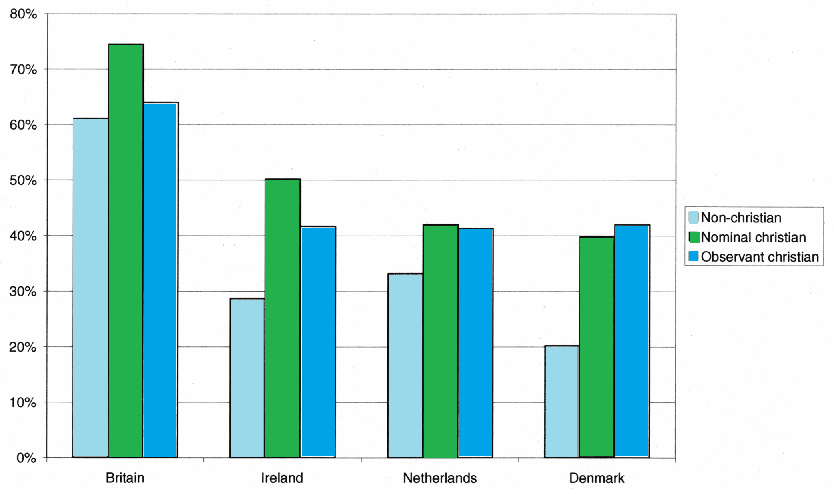There are many types of religion. In Europe, most people when asked would call themselves ‘Christian’, even if they rarely (if ever) go to church, and have only a shaky grasp of the core Christian beliefs (you might have seen the recent survey commissioned by the Dawkins Foundation for Reason and Science looking into this very issue).
These people are quite different from the dutiful Christians who go to Church and, you know, believe in god and all that stuff. Earlier this year I wrote about some research by Ingrid Storm, at Manchester University in the UK, who showed that observant Christians in Britain are less likely than ‘nominal’ Christians to think that immigration is a threat to national identity.
In a second study, she compared four North European nations – Britain, Ireland, The Netherlands and Denmark. Britain is unusual among these nations for the high level of hostility towards immigrants. And while in all nations, non-Christians are the least hostile towards migrants (this group includes the non-religious but also Muslims, Jews etc), the difference between nominal Christians and observant Christians is only obvious in Britain and Ireland.
However, when Storm crunched the stats she found that, even in The Netherlands and Denmark, regular churchgoers were a little less hostile to immigrants than non-churchgoers.
Interestingly in Ireland, but not in Denmark or the Netherlands, those who were hostile to atheists were also less hostile to immigrants.
Overall, the numbers show a complicated picture. Clearly, religious people are more hostile to immigrants in all nations, but this seems to be mediated by beliefs that being Christian is integral to national identity. So, for example, members of the Danish Folk Church are particularly hostile to immigrants.
But it also seems to be mediated by a fear of Muslims. Hostility to Muslims helped to explain the religion-anti-immigration attitudes in Britain, The Netherlands, and Denmark, although that wasn’t the case in Ireland. Maybe that’s because Ireland has relatively few immigrants, and especially few Muslim immigrants.
So although religious people in these countries tend to be hostile to immigrants, it doesn’t seem to have much to do with their religious beliefs, as such. Rather, it’s because religion is used as a tool to separate ‘us’ from ‘them’.
 This article by Tom Rees was first published on Epiphenom. It is licensed under Creative Commons.
This article by Tom Rees was first published on Epiphenom. It is licensed under Creative Commons.















